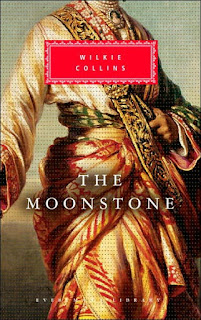“I address these lines — written in India — to my relatives in England.”
The Moonstone …….. a yellow diamond, sacred to the Indian people, guarded over by an ancient curse and three Brahmins devoted to its preservation. Yet the revered diamond is stolen. Time passes, and the Moonstone ends up in the hands of Colonel Hearncastle who returns to England with the ill-fated gem. Angry at the relatives who shun his advances, he leaves the Moonstone in his will to his niece, Rachel Verinder. Did the Colonel leave the stone as a profitable legacy, or was it intended to wreak destruction on those who had earlier rejected his gruff overtures?
Rachel’s cousin, Franklin Blake, arrives with the diamond, which is to be bestowed on her during her eighteenth birthday party at her mother’s Yorkshire estate. However, there are already disturbing echoes of disruption within the family home. A housemaid, Rosanna Spearman, a reformed thief, appears both agitated and love-stricken, exhibiting suspicious behaviour, and three Indian jugglers are spotted in town. The culmination of these oddities result in the diamond disappearing the night it is given to Rachel. Who perpetrated the theft? Why is Rachel behaving with a reckless and stubborn agitation? Rosanna’s death further complicates the situation and finally Sergeant Cuff, a respected policemen from London is called in to solve the mystery.
 |
| source Wikipedia |
Considered one of the first detective novels, The Moonstone was bathed in a shower of critical acclaim. T.S. Eliot claimed that it was “the first, the longest and the best of modern English detective novels in a genre invented by Wilkie Collins and not by Poe.” Dorothy Sayers, writer of the Peter Wimsey mysteries, hailed it as “probably the very finest detective novel ever written,” and G.K. Chesterton, creator of the detective Father Brown, declared it “the best detective tale in the world.” Collins himself was attempting an inversion of his earlier novel of suspense, The Woman In White, where he designed the circumstances to affect the characters of the novel. With The Moonstone, Collins chose to turn that premise on its head and investigate how different characters influence their circumstances. The characters are sometimes wrong and at other times right in their perceptions, but nevertheless each works to shape the outcome of a situation. This psychological experiment was a brilliant invention of Collins, adding more mystery and suspense to a story already ripe with uncertainty.
Luckily, I chose to read this one on vacation over the Christmas holidays and was able to fly through it in 2 days with it glued to my hands. I could hardly put it down, a tribute to Collins’ powerful and cryptic narrative. The story is a wee bit sensational but being a detective novel, I don’t think it affected the story in a negative way. The characters are all well delineated (except one is rather overdone; I’ll leave you to guess which one) and the method of presenting the novel in an epistolary style is again, an unusual but effective technique. Collins’ The Moonstone was a great way to start off a year of reading!





